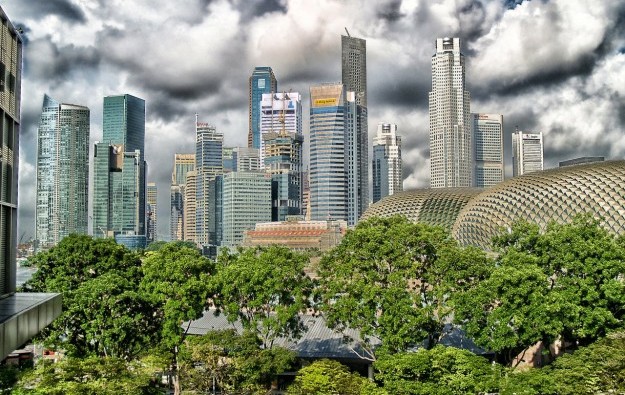Policy, competition, weigh on Singapore casinos: Fitch
Oct 31, 2014 Newsdesk Latest News, Singapore, Top of the deck

Singapore’s casinos face increased regional competition, and “potential changes to gaming policies that weigh on their medium-term growth and profitability outlook”, said Fitch Ratings Inc in a statement issued on Thursday.
On October 9, GGRAsia reported that a Singapore lawmaker had called for an increase in the levy imposed on Singapore citizens and permanent residents for entry to the city-state’s two casino resorts: Resorts World Sentosa (RWS), operated by Genting Singapore Plc, and Marina Bay Sands (MBS), operated by Las Vegas Sands Corp.
The levy currently stands at SGD100 (US$79) per 24-hour period, or SGD2,000 for a one-year pass.
“Political momentum is unlikely to shift towards greater liberalisation, at least in the short term, with recent parliamentary debates focusing on gaming policy,” said Fitch.
On October 7, Singapore’s parliament passed a bill barring online gambling in the city-state, although with exemptions.
The ratings agency added in its latest statement: “Growth in Singapore [casino] gaming revenue has stalled, and is likely to contract slightly in 2014 with macroeconomic and political factors in China being the principal cause.”
In the second quarter of 2014, Genting Singapore’s net profit actually fell 22 percent year-on-year, largely due to greater than expected impairment charges on receivables – mainly in the form of debt owed by VIP gamblers.
Data from the Singapore Tourism Board, released in mid-October, show that in the second quarter the number of mainland Chinese tourists visiting Singapore fell 47 percent year-on-year, and nearly 44 percent judged quarter-on-quarter.
Fitch said in its statement: “A slowdown in China’s economic growth, recent corruption crackdown, and credit tightening have had a particularly strong impact on Singapore’s casinos. The VIP business, which is mostly Chinese, accounts for roughly half of total gaming revenue at MBS and RWS.”
The agency added: “Fitch expects VIP numbers to improve in the latter part of 2015, and maintains that the tightening restrictions within China are temporary. However, the ability of Singapore’s gaming industry to tap into a Chinese recovery and the broader growth will be challenged in the longer term, especially as it faces increased regional competition from new casinos in the Philippines, Macau and, potentially, Japan.”
The agency said a positive is that Singapore’s “accommodating” gaming tax is fixed at current rates at least until 2022. The city-state levies 15 percent gaming tax on mass-market play and 5 percent on VIP play – plus 7 percent Goods and Services Tax in both cases, compared to Macau’s effective tax rate on gross gaming revenue of 39 percent.
“…however, the tax rate could be revisited as the government considers granting additional licences when the duopoly period ends in 2017,” added Fitch.
“The government has been tight-lipped on the subject, but recent political discussions suggest that it is unlikely that more gaming licences would be granted. However, it remains a potential risk for Singapore’s existing casino operators, and the market remains very attractive to new entrants despite the potential for more regional competition,” said the rating agency.
Related articles
-
 MBS Tower 3 rooms revamp now by 2Q...
MBS Tower 3 rooms revamp now by 2Q...Jul 25, 2024
-
 Sands China 2Q EBITDA down q-o-q amid...
Sands China 2Q EBITDA down q-o-q amid...Jul 25, 2024
More news
-
 Donaco EBITDA up y-o-y to above US$4mln...
Donaco EBITDA up y-o-y to above US$4mln...Jul 26, 2024
-
 HK listed Palasino upgrades Czech...
HK listed Palasino upgrades Czech...Jul 26, 2024
Latest News
Jul 26, 2024
Border-casino operator Donaco International Ltd has achieved a 164.17-percent year-on-year increase in its latest quarterly group earnings before interest, taxation, depreciation and amortisation...Sign up to our FREE Newsletter
 (Click here for more)
(Click here for more)
Pick of the Day
”We’ve got more traction outside of Macau at the moment. But Macau’s going be a bigger focus for us”
David Punter
Regional representative at Konami Australia
Most Popular
 Sheraton brand to exit Londoner Macao, to be Londoner Grand July 25, 2024
Sheraton brand to exit Londoner Macao, to be Londoner Grand July 25, 2024  Macau regulator probes unlicensed gaming agents July 24, 2024
Macau regulator probes unlicensed gaming agents July 24, 2024  Philippines gives 20k aliens in POGOs 60 days to leave July 25, 2024
Philippines gives 20k aliens in POGOs 60 days to leave July 25, 2024  Philippines-listed DigiPlus says not affected by POGO ban July 24, 2024
Philippines-listed DigiPlus says not affected by POGO ban July 24, 2024  Sands China 2Q EBITDA down q-o-q amid low hold, renovation July 25, 2024
Sands China 2Q EBITDA down q-o-q amid low hold, renovation July 25, 2024






